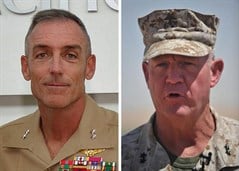The Washington Post yesterday carried the extraordinary story of two Marine generals fired after a 2012 Afghan insurgent attack on Camp Leatherneck/Camp Bastion in Afghanistan’s Helmand province. The attack by a handful of Afghan fighters resulted in two dead Marines, as well as the destruction of half a dozen AV-8B Harrier jets at a cost of some $200 million.
Maj. Gen. Charles M. Gurganus, the top Marine commander in southern Afghanistan at the time, and Maj. Gen. Gregg A. Sturdevant, the senior Marine aviation officer in the area, were fired for “failing to assign sufficient military personnel to secure the area” and for failing “to exercise the level of judgment expected of commanders of their rank,” respectively.
It was “the first time since the Vietnam war that a US general has been fired for negligence after an enemy attack,” the Post wrote.
In the year preceeding the attack, US troop strength in the area of operations had been cut in half as a result of the US administration’s draw-down policy in Afghanistan. The US Marines responsible for protecting Camp Bastion, the British-run NATO airfield, and the adjoining US Camp Leatherneck, had been cut by two-thirds in that same period. Gen. Gurganus’s request for an additional 160 troops to protect the area was rejected.
On the night of the attack, the British placed soldiers from the small Pacific Island nation of Tonga in charge of the watchtowers, and a tower they left unmanned was the one breached by Taliban fighters.
It is difficult to second-guess the decision to fire the two generals without all the facts, but the whole incident raises at least two very troubling questions.
First, as welcome (and overdue) as is the draw-down of US troops from Afghanistan, are US troops and their commanders being expected to do the unreasonable on the ground to satisfy the president’s desire to be seen as “ending the wars” started by his predecessor? In the desperate (and ultimately futile) effort to make the longest war in American history seem like some kind of success are the troops being left out to dangle in hopes that the coming chaos can be delayed in some manner? Are facts on the ground being manipulated to fit the narrative?
Ron Paul once said “we just marched in, we can just march out.” We are obviously not doing that.
Second, and perhaps more importantly, there has been a rush, particularly since the first President Bush’s attack on Iraq in 1990, to portray US military operations as “coalitions of the willing,” to give the impression that the entire world that matters is on “our side” and sending soldiers and money to support the effort.
In the first Gulf war, troops from at least ten countries fought in the “coalition,” supported by nearly 40 others. This grand coalition included, as might be expected, a number of militarily insignificant countries. But it was good propaganda.
In the war on Afghanistan, some 47 countries contributed troops to the US effort to overthrow the Taliban government in retribution for the Taliban’s hosting of elements from abroad (mostly Saudi Arabia) that attacked the US on 9/11.
US troops fought alongside those from Tonga, El Salvador, Albania, Georgia, Montenegro, and many other countries who had much to gain politically from being seen to support Washington’s efforts to establish a modern, Western democracy in Afghanistan. Some, like Saakashvili‘s Georgia, hoped that sacrificing a few troops for Washington in Afghanistan might gain them the ultimate prize of NATO membership. Others had other motives, not all as self-serving to be sure.
But in President George W. Bush’s rush to show the world that “the world is with us” in Afghanistan, did this politically desired outcome result in US troops being placed unnessarily in harm’s way? In other, more direct, words, how many US soldiers were killed due to interoperability and other integration problems to make the political point that US policy was widely supported?
Similar efforts to demonstrate a grand pro-US coalition were made in Libya and attempted in Syria. What are the costs of such moves?

